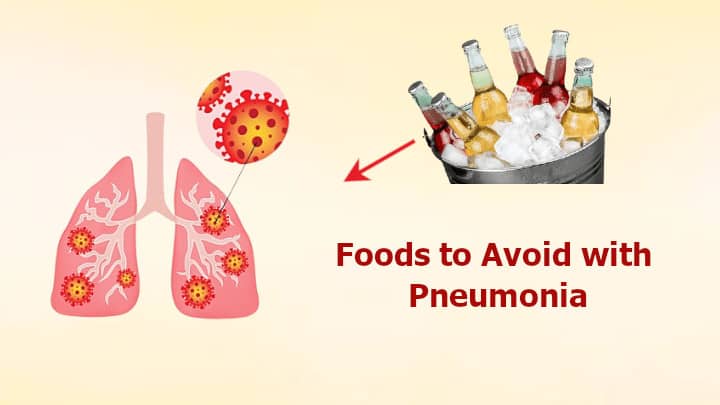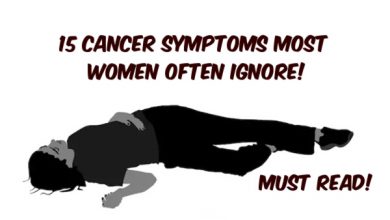9 Foods to Avoid with Pneumonia Patient

Are you looking for foods to avoid with pneumonia? A severe lung infection known as pneumonia can impair breathing and result in fever, chest discomfort, and other symptoms. Your food might affect your recovery even if antibiotics and other medical treatments can help fight the infection. It may be more difficult for your body to fight off the infection if you eat certain foods since they might cause inflammation.
To help your body’s healing process and promote rapid recovery from pneumonia, we’ll discuss the foods to avoid with pneumonia.
In This Article
Foods to Avoid with Pneumonia
Here is the list of foods to avoid with pneumonia-
1. Avoid Cold foods and Drinks
Ice cream and other cold foods and beverages can cause the blood vessels in the throat and lungs to constrict, making it harder to breathe and exacerbating pneumonia symptoms like coughing and chest congestion.
Additionally, eating cold foods like ice cream might, in some people, trigger a reflex reaction that results in increased mucus production, making it more difficult to evacuate mucus and phlegm from the lungs.
2. Say no to Fried or greasy foods
Fried or fatty foods should be avoided if you have pneumonia since they increase your chance of getting the infection. High quantities of fat and oil are present in fried and greasy meals, which are significant contributors to inflammation.
3. Avoid Dairy Foods
Milk, cheese, and butter are dairy products that can be hard to digest and may lead to a buildup of mucus in the respiratory system. This may make it more difficult for the lungs to expel mucus and phlegm, worsening pneumonia symptoms like coughing and chest congestion.
Additionally, some people may be lactose intolerant, so ingesting dairy products may make them feel bloated, gassy, and sick.
4. Avoid Acidic Foods
Acidic foods like Lemon, oranges, and vinegar can be harmful to the respiratory system and throat, which are susceptible to pneumonia. These foods’ acidity can irritate and inflame the lungs, making breathing harder and increasing symptoms like coughing and tightness in the chest. Additionally, eating acidic foods might cause acid reflux—a frequent problem in individuals with pneumonia.
5. Too much Salt
Overeating salt can harm those with pneumonia since it can lead to fluid retention, impair lung expansion and complicate breathing. A high-salt diet can also raise blood pressure, which can pressure the heart and lungs more.
Salt consumption should typically be restricted, especially for those who have pneumonia or other respiratory diseases.
6. High Sugar Consumption
High sugar intake can impair immunity and reduce the body’s ability to fight off infection, particularly in the case of pneumonia. Increased blood sugar levels brought on by consuming a lot of sugar can result in inflammation throughout the body.
The immune system’s function may be impaired by this inflammation, making it more challenging for the body to fight off viruses or bacteria that cause pneumonia.
7. Avoid Refined Carbohydrates
Pneumonia risk is known to be increased by refined carbohydrates, such as those included in white bread, pasta, cereal, and sugary beverages. These carbohydrates immediately convert to glucose, which is rapidly taken into the bloodstream.
High glucose levels can contribute to an increase in oxidative stress and inflammation. This can harm cells and encourage infection.
8. Artificial Sweeteners
Artificial sweeteners can harm your lungs since they increase your risk of developing pneumonia. Particularly, aspartame and other artificial sweeteners can constrict your airways, making breathing difficult.
9. Say no to Alcohol
There are several ways that alcohol might make pneumonia worse. For instance, alcohol can cause the production of mucus to increase, which can make it more difficult for the lungs to breathe.
Alcohol can also inflame and infect the lungs. The body’s capacity to fight infection can be compromised by alcohol, which increases the risk of pneumonia.
In Closing
In conclusion, paying attention to your nutrition as you recover from pneumonia is essential. Cold foods and drinks, processed foods, fried foods, dairy products, and excessive salt intake can all cause inflammation and make it more difficult for your body to fight off the infection.
Avoiding these foods and focusing on nutrient-rich alternatives can help your body recover more quickly. As you recover from pneumonia, remember that it is always advisable to consult a health professional to identify the ideal diet.
Read Also:
References
- Nutritional status, diet and viral respiratory infections
- Fatty acid intake and the risk of community-acquired pneumonia in US women
- Diet and Respiratory Infections: Specific or Generalized Associations




